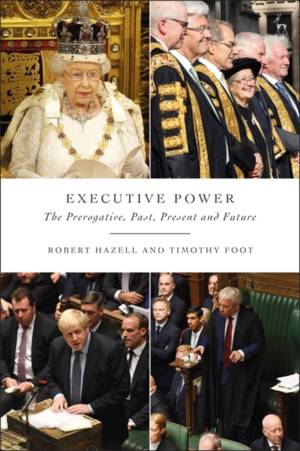
- Afhalen na 1 uur in een winkel met voorraad
- Gratis thuislevering in België vanaf € 30
- Ruim aanbod met 7 miljoen producten
- Afhalen na 1 uur in een winkel met voorraad
- Gratis thuislevering in België vanaf € 30
- Ruim aanbod met 7 miljoen producten
Zoeken
Executive Power
The Prerogative, Past, Present and Future
Robert Hazell, Timothy Foot
Hardcover | Engels
€ 203,95
Omschrijving
The prerogative has long been a mystery to most observers; this book demystifies it.
It explains each of the prerogative powers in separate chapters. It clarifies the respective roles of government, Parliament and the courts in defining the extent of prerogative powers, and in regulating their use. It also looks at which powers should be codified in statute, which should be regulated by convention, and which could be left at large.
The book is very timely in contributing to current debates. The fevered parliamentary debates over Brexit thrust the prerogative centre-stage. Recent controversies have ranged from the role of Parliament in assenting to treaties, to the prorogation and dissolution of Parliament, to the grant or withholding of royal assent to bills.
In their 2019 election manifesto, the Conservative Party stated that 'After Brexit we also need to look at the broader aspects of our constitution, the relationship between the Government, Parliament and the courts; the functioning of the Royal Prerogative...'.
The book covers the whole range of prerogative powers, from going to war and ratifying treaties, appointing and dismissing ministers, regulating the civil service and public appointments, to the grant of honours and pardons and the issue of passports. Its 19 chapters provide a comprehensive guide to the operation of the prerogative - past, present, and future - together with suggestions for reform.
It explains each of the prerogative powers in separate chapters. It clarifies the respective roles of government, Parliament and the courts in defining the extent of prerogative powers, and in regulating their use. It also looks at which powers should be codified in statute, which should be regulated by convention, and which could be left at large.
The book is very timely in contributing to current debates. The fevered parliamentary debates over Brexit thrust the prerogative centre-stage. Recent controversies have ranged from the role of Parliament in assenting to treaties, to the prorogation and dissolution of Parliament, to the grant or withholding of royal assent to bills.
In their 2019 election manifesto, the Conservative Party stated that 'After Brexit we also need to look at the broader aspects of our constitution, the relationship between the Government, Parliament and the courts; the functioning of the Royal Prerogative...'.
The book covers the whole range of prerogative powers, from going to war and ratifying treaties, appointing and dismissing ministers, regulating the civil service and public appointments, to the grant of honours and pardons and the issue of passports. Its 19 chapters provide a comprehensive guide to the operation of the prerogative - past, present, and future - together with suggestions for reform.
Specificaties
Betrokkenen
- Auteur(s):
- Uitgeverij:
Inhoud
- Aantal bladzijden:
- 344
- Taal:
- Engels
Eigenschappen
- Productcode (EAN):
- 9781509951444
- Verschijningsdatum:
- 3/11/2022
- Uitvoering:
- Hardcover
- Formaat:
- Genaaid
- Afmetingen:
- 156 mm x 234 mm
- Gewicht:
- 657 g

Alleen bij Standaard Boekhandel
Beoordelingen
We publiceren alleen reviews die voldoen aan de voorwaarden voor reviews. Bekijk onze voorwaarden voor reviews.








